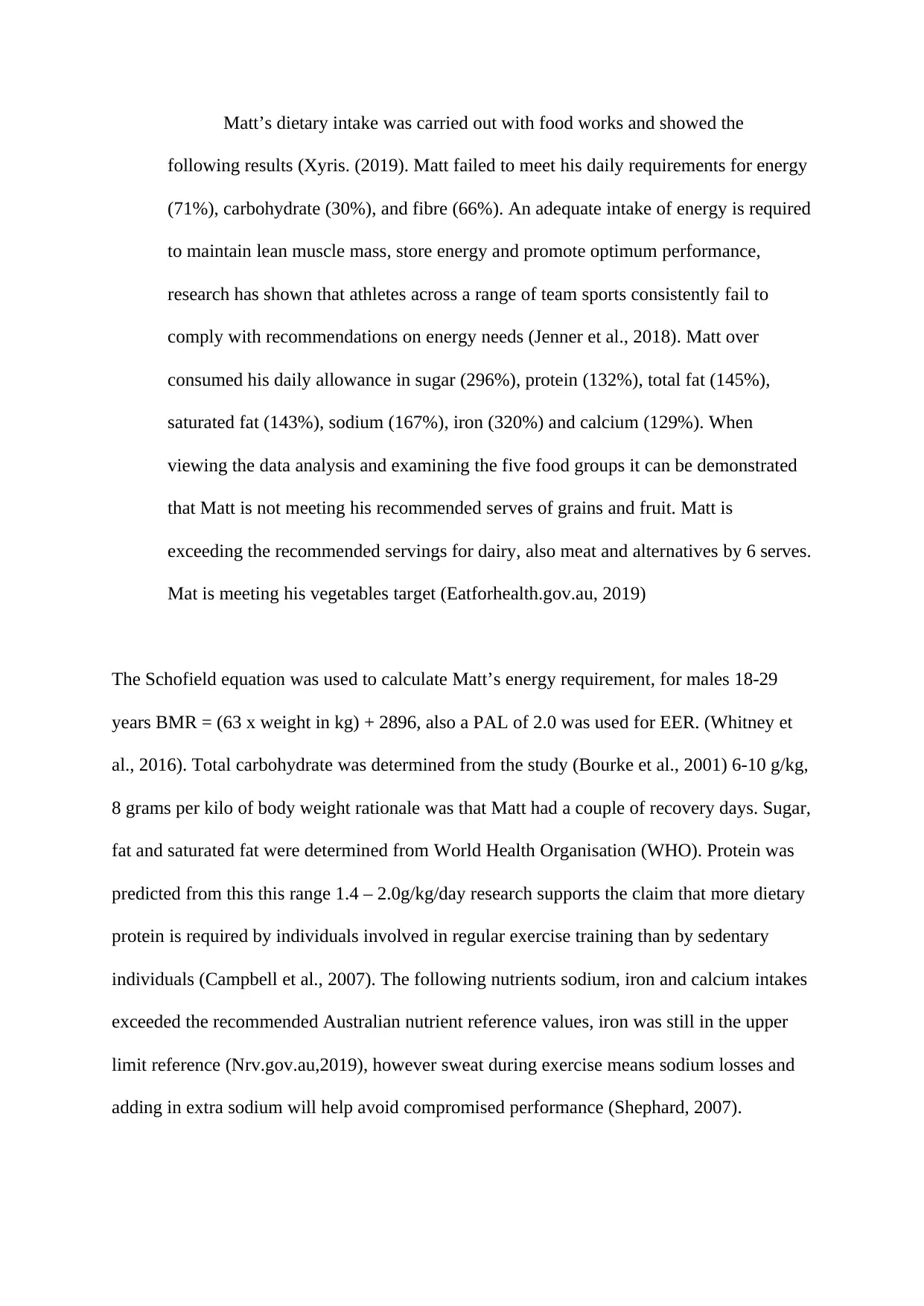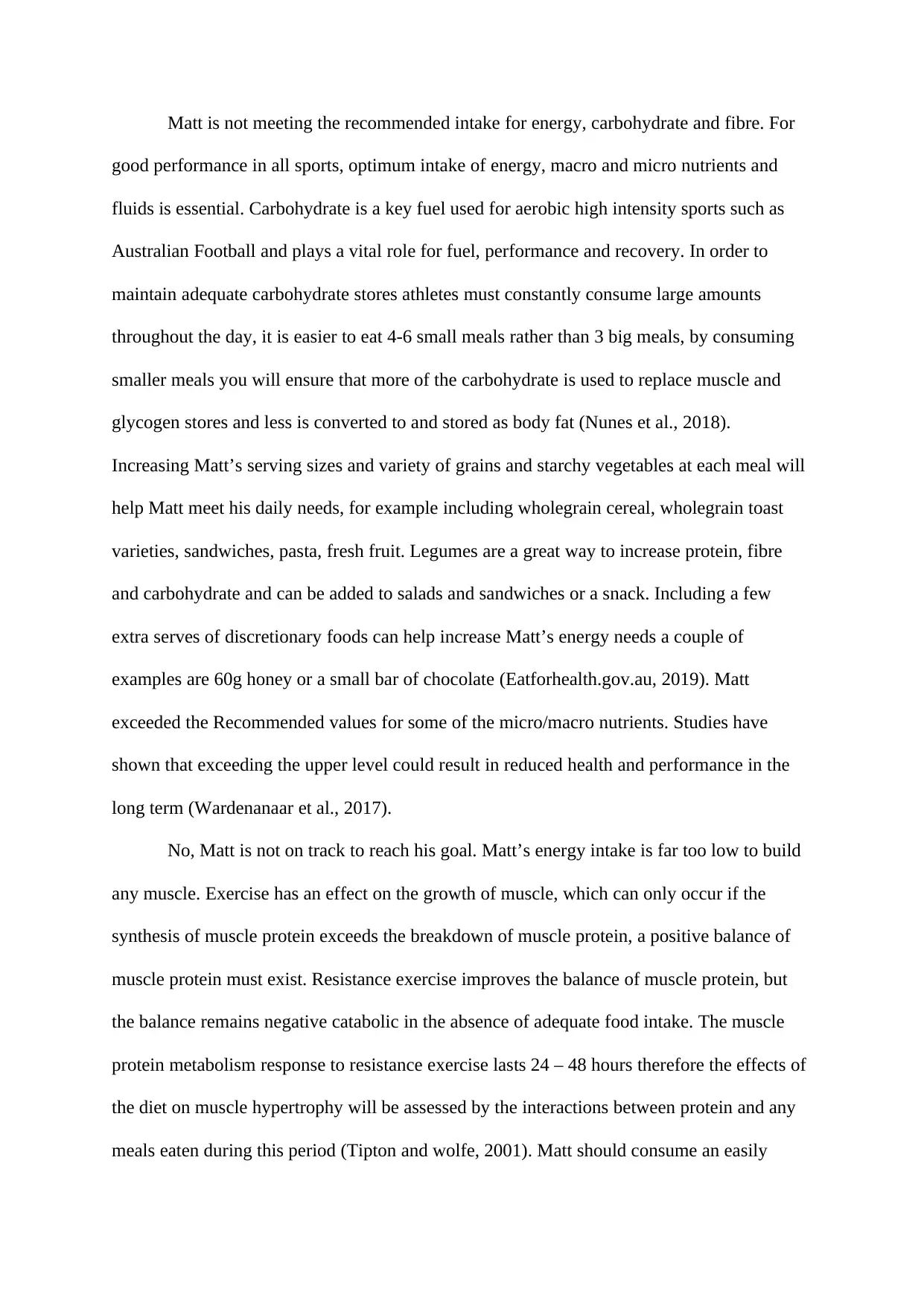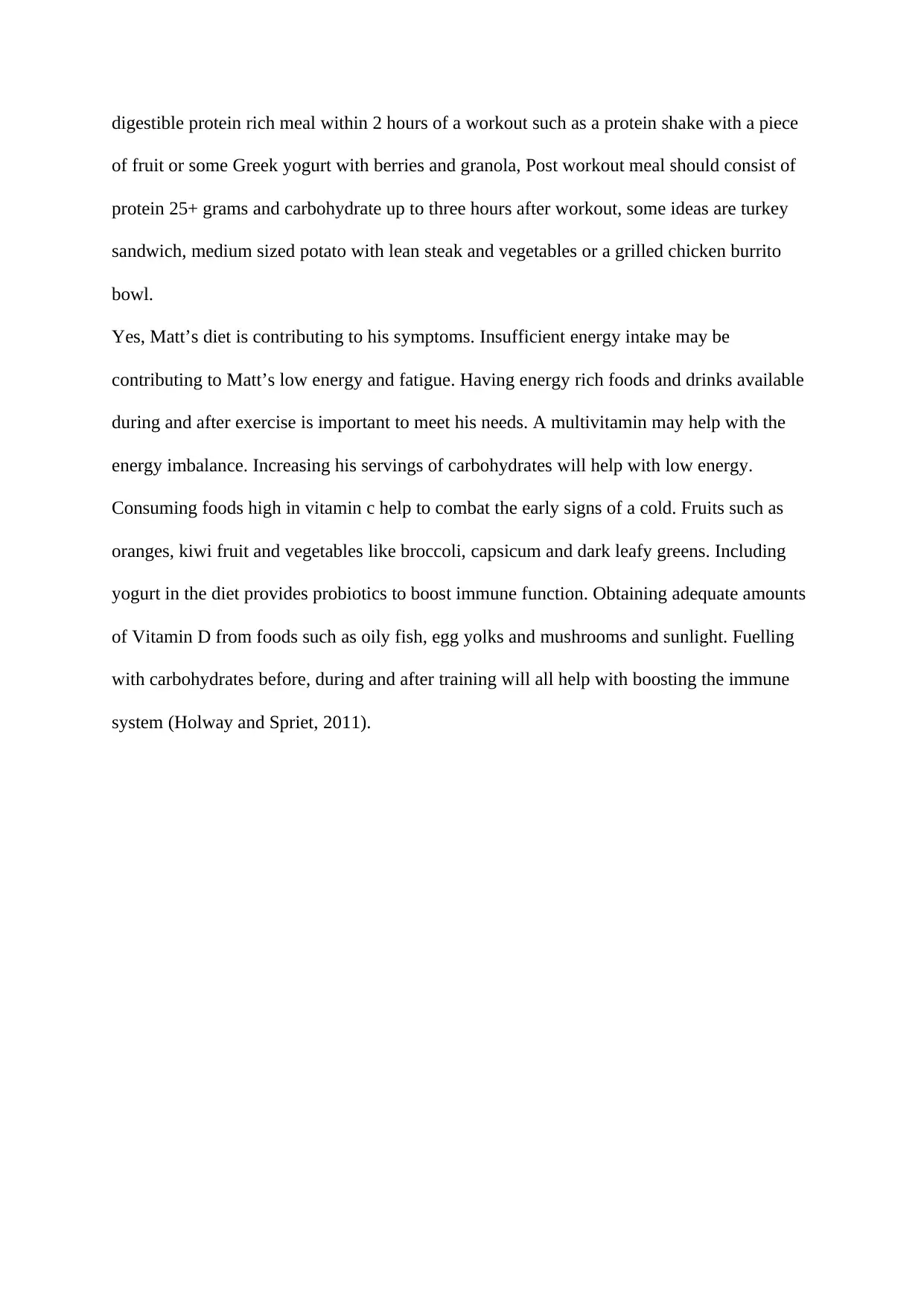Nutritional Assessment: Analysis of Matt's Dietary Intake and Needs
VerifiedAdded on 2023/01/18
|3
|1023
|98
Homework Assignment
AI Summary
This assignment analyzes Matt's dietary intake based on food works data, revealing significant deficiencies in energy, carbohydrates, and fiber, while also showing overconsumption of sugar, protein, fats, sodium, iron, and calcium. The analysis compares Matt's intake to recommended values, calculates his energy requirements using the Schofield equation, and provides detailed recommendations to improve his diet. The paper emphasizes the importance of adequate carbohydrate intake for performance and recovery, suggests increasing servings of grains, fruits, and legumes, and recommends post-workout meals to support muscle protein synthesis. The assignment also addresses the impact of Matt's diet on his symptoms and provides suggestions for addressing his low energy and potential immune system support through dietary changes, including the consumption of vitamin-rich foods and probiotics.

Matt’s dietary intake was carried out with food works and showed the
following results (Xyris. (2019). Matt failed to meet his daily requirements for energy
(71%), carbohydrate (30%), and fibre (66%). An adequate intake of energy is required
to maintain lean muscle mass, store energy and promote optimum performance,
research has shown that athletes across a range of team sports consistently fail to
comply with recommendations on energy needs (Jenner et al., 2018). Matt over
consumed his daily allowance in sugar (296%), protein (132%), total fat (145%),
saturated fat (143%), sodium (167%), iron (320%) and calcium (129%). When
viewing the data analysis and examining the five food groups it can be demonstrated
that Matt is not meeting his recommended serves of grains and fruit. Matt is
exceeding the recommended servings for dairy, also meat and alternatives by 6 serves.
Mat is meeting his vegetables target (Eatforhealth.gov.au, 2019)
The Schofield equation was used to calculate Matt’s energy requirement, for males 18-29
years BMR = (63 x weight in kg) + 2896, also a PAL of 2.0 was used for EER. (Whitney et
al., 2016). Total carbohydrate was determined from the study (Bourke et al., 2001) 6-10 g/kg,
8 grams per kilo of body weight rationale was that Matt had a couple of recovery days. Sugar,
fat and saturated fat were determined from World Health Organisation (WHO). Protein was
predicted from this this range 1.4 – 2.0g/kg/day research supports the claim that more dietary
protein is required by individuals involved in regular exercise training than by sedentary
individuals (Campbell et al., 2007). The following nutrients sodium, iron and calcium intakes
exceeded the recommended Australian nutrient reference values, iron was still in the upper
limit reference (Nrv.gov.au,2019), however sweat during exercise means sodium losses and
adding in extra sodium will help avoid compromised performance (Shephard, 2007).
following results (Xyris. (2019). Matt failed to meet his daily requirements for energy
(71%), carbohydrate (30%), and fibre (66%). An adequate intake of energy is required
to maintain lean muscle mass, store energy and promote optimum performance,
research has shown that athletes across a range of team sports consistently fail to
comply with recommendations on energy needs (Jenner et al., 2018). Matt over
consumed his daily allowance in sugar (296%), protein (132%), total fat (145%),
saturated fat (143%), sodium (167%), iron (320%) and calcium (129%). When
viewing the data analysis and examining the five food groups it can be demonstrated
that Matt is not meeting his recommended serves of grains and fruit. Matt is
exceeding the recommended servings for dairy, also meat and alternatives by 6 serves.
Mat is meeting his vegetables target (Eatforhealth.gov.au, 2019)
The Schofield equation was used to calculate Matt’s energy requirement, for males 18-29
years BMR = (63 x weight in kg) + 2896, also a PAL of 2.0 was used for EER. (Whitney et
al., 2016). Total carbohydrate was determined from the study (Bourke et al., 2001) 6-10 g/kg,
8 grams per kilo of body weight rationale was that Matt had a couple of recovery days. Sugar,
fat and saturated fat were determined from World Health Organisation (WHO). Protein was
predicted from this this range 1.4 – 2.0g/kg/day research supports the claim that more dietary
protein is required by individuals involved in regular exercise training than by sedentary
individuals (Campbell et al., 2007). The following nutrients sodium, iron and calcium intakes
exceeded the recommended Australian nutrient reference values, iron was still in the upper
limit reference (Nrv.gov.au,2019), however sweat during exercise means sodium losses and
adding in extra sodium will help avoid compromised performance (Shephard, 2007).
Paraphrase This Document
Need a fresh take? Get an instant paraphrase of this document with our AI Paraphraser

Matt is not meeting the recommended intake for energy, carbohydrate and fibre. For
good performance in all sports, optimum intake of energy, macro and micro nutrients and
fluids is essential. Carbohydrate is a key fuel used for aerobic high intensity sports such as
Australian Football and plays a vital role for fuel, performance and recovery. In order to
maintain adequate carbohydrate stores athletes must constantly consume large amounts
throughout the day, it is easier to eat 4-6 small meals rather than 3 big meals, by consuming
smaller meals you will ensure that more of the carbohydrate is used to replace muscle and
glycogen stores and less is converted to and stored as body fat (Nunes et al., 2018).
Increasing Matt’s serving sizes and variety of grains and starchy vegetables at each meal will
help Matt meet his daily needs, for example including wholegrain cereal, wholegrain toast
varieties, sandwiches, pasta, fresh fruit. Legumes are a great way to increase protein, fibre
and carbohydrate and can be added to salads and sandwiches or a snack. Including a few
extra serves of discretionary foods can help increase Matt’s energy needs a couple of
examples are 60g honey or a small bar of chocolate (Eatforhealth.gov.au, 2019). Matt
exceeded the Recommended values for some of the micro/macro nutrients. Studies have
shown that exceeding the upper level could result in reduced health and performance in the
long term (Wardenanaar et al., 2017).
No, Matt is not on track to reach his goal. Matt’s energy intake is far too low to build
any muscle. Exercise has an effect on the growth of muscle, which can only occur if the
synthesis of muscle protein exceeds the breakdown of muscle protein, a positive balance of
muscle protein must exist. Resistance exercise improves the balance of muscle protein, but
the balance remains negative catabolic in the absence of adequate food intake. The muscle
protein metabolism response to resistance exercise lasts 24 – 48 hours therefore the effects of
the diet on muscle hypertrophy will be assessed by the interactions between protein and any
meals eaten during this period (Tipton and wolfe, 2001). Matt should consume an easily
good performance in all sports, optimum intake of energy, macro and micro nutrients and
fluids is essential. Carbohydrate is a key fuel used for aerobic high intensity sports such as
Australian Football and plays a vital role for fuel, performance and recovery. In order to
maintain adequate carbohydrate stores athletes must constantly consume large amounts
throughout the day, it is easier to eat 4-6 small meals rather than 3 big meals, by consuming
smaller meals you will ensure that more of the carbohydrate is used to replace muscle and
glycogen stores and less is converted to and stored as body fat (Nunes et al., 2018).
Increasing Matt’s serving sizes and variety of grains and starchy vegetables at each meal will
help Matt meet his daily needs, for example including wholegrain cereal, wholegrain toast
varieties, sandwiches, pasta, fresh fruit. Legumes are a great way to increase protein, fibre
and carbohydrate and can be added to salads and sandwiches or a snack. Including a few
extra serves of discretionary foods can help increase Matt’s energy needs a couple of
examples are 60g honey or a small bar of chocolate (Eatforhealth.gov.au, 2019). Matt
exceeded the Recommended values for some of the micro/macro nutrients. Studies have
shown that exceeding the upper level could result in reduced health and performance in the
long term (Wardenanaar et al., 2017).
No, Matt is not on track to reach his goal. Matt’s energy intake is far too low to build
any muscle. Exercise has an effect on the growth of muscle, which can only occur if the
synthesis of muscle protein exceeds the breakdown of muscle protein, a positive balance of
muscle protein must exist. Resistance exercise improves the balance of muscle protein, but
the balance remains negative catabolic in the absence of adequate food intake. The muscle
protein metabolism response to resistance exercise lasts 24 – 48 hours therefore the effects of
the diet on muscle hypertrophy will be assessed by the interactions between protein and any
meals eaten during this period (Tipton and wolfe, 2001). Matt should consume an easily

digestible protein rich meal within 2 hours of a workout such as a protein shake with a piece
of fruit or some Greek yogurt with berries and granola, Post workout meal should consist of
protein 25+ grams and carbohydrate up to three hours after workout, some ideas are turkey
sandwich, medium sized potato with lean steak and vegetables or a grilled chicken burrito
bowl.
Yes, Matt’s diet is contributing to his symptoms. Insufficient energy intake may be
contributing to Matt’s low energy and fatigue. Having energy rich foods and drinks available
during and after exercise is important to meet his needs. A multivitamin may help with the
energy imbalance. Increasing his servings of carbohydrates will help with low energy.
Consuming foods high in vitamin c help to combat the early signs of a cold. Fruits such as
oranges, kiwi fruit and vegetables like broccoli, capsicum and dark leafy greens. Including
yogurt in the diet provides probiotics to boost immune function. Obtaining adequate amounts
of Vitamin D from foods such as oily fish, egg yolks and mushrooms and sunlight. Fuelling
with carbohydrates before, during and after training will all help with boosting the immune
system (Holway and Spriet, 2011).
of fruit or some Greek yogurt with berries and granola, Post workout meal should consist of
protein 25+ grams and carbohydrate up to three hours after workout, some ideas are turkey
sandwich, medium sized potato with lean steak and vegetables or a grilled chicken burrito
bowl.
Yes, Matt’s diet is contributing to his symptoms. Insufficient energy intake may be
contributing to Matt’s low energy and fatigue. Having energy rich foods and drinks available
during and after exercise is important to meet his needs. A multivitamin may help with the
energy imbalance. Increasing his servings of carbohydrates will help with low energy.
Consuming foods high in vitamin c help to combat the early signs of a cold. Fruits such as
oranges, kiwi fruit and vegetables like broccoli, capsicum and dark leafy greens. Including
yogurt in the diet provides probiotics to boost immune function. Obtaining adequate amounts
of Vitamin D from foods such as oily fish, egg yolks and mushrooms and sunlight. Fuelling
with carbohydrates before, during and after training will all help with boosting the immune
system (Holway and Spriet, 2011).
⊘ This is a preview!⊘
Do you want full access?
Subscribe today to unlock all pages.

Trusted by 1+ million students worldwide
1 out of 3
Related Documents
Your All-in-One AI-Powered Toolkit for Academic Success.
+13062052269
info@desklib.com
Available 24*7 on WhatsApp / Email
![[object Object]](/_next/static/media/star-bottom.7253800d.svg)
Unlock your academic potential
Copyright © 2020–2026 A2Z Services. All Rights Reserved. Developed and managed by ZUCOL.




